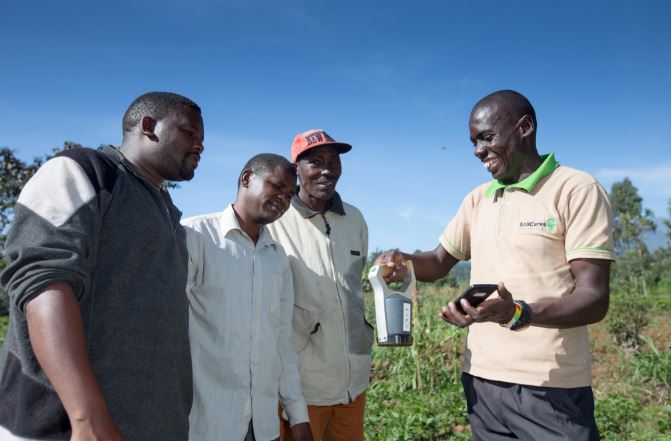Syngenta Agronomist Maureen Namusonge points to high-yielding Tylka F1 tomatoes at the seed company's demonstration farm at Mukomani, Mombasa, ASK Show ground on September 2, 2016. A part time farmer has adopted tomato production during heavy rains to make profits. PHOTO BY LABAN ROBERT.
While heavy rains and drought cause losses to farmers, one flight engineer is turning this into a profit making opportunity due to the shortages created by such disasters.
John Okinyi, who works for a local airline, made a net profit after the rains that hit the country in April 2016 after harvesting at least 250 crates of tomatoes weighing 64kg from one acre in Athi River, Machakos County.
The part-time farmer however warned that despite the high demand for the fruit he enjoyed in June after harvesting, maintaining the tomatoes through the rainy season was expensive.
He spend at least Sh200,000 from March to June in application of agrochemical to mitigate the effects of the rains as a result of too much water.
“It was expensive. But the retune were impressive. Although I could have harvested up to 300 crates, the drawbacks were still good and I recovered my investment,” Okinyi said.
He never looked for the market; buyers from Nairobi City flocked his farm to purchase the harvest. Tomatoes are usually sold in graded crates.
Depending on the size, Okinyi varied the price from Sh4,000 to Sh6,000. In total, the gross income was Sh1.25 million.
At times the 64kg crate fetches up to Sh8,000 when the demand is more than the supply.
Besides the harsh weather the Shanty F1 variety he bought from Amiran Kenya, helped him achieve good results.
“Many farmers shy away from this hybrid because it is more expensive than other varieties. I prefer it because it is tolerant to harsh open field conditions as well as diseases,” he said.
READ ALSO: Ripe tomatoes sold for 30 days
READ ALSO: Long rains, political uncertainty double the price of tomatoes
READ ALSO: Hotels demand for tomatoes more than triple young farmers’ incomes
He planted 10,000 seedlings in the one acre. He has placed another 10,000 seeds in the nursery bed for transplanting by mid February 2017. By April, the usual heavy rainfall period, he hopes to be supplying the tomatoes.
He has one worker. He spends most of the 15 days he is off-duty in the farm. By mid this year, he plans to bring seven acres of land in Kitengela under tomato cultivation. He banks on a borehole for irrigation.
“No job is satisfying in salary. Farming is the best side hustle that can thrust one to self sufficiency. If you can harvest over Sh900,000 from one acre in three months, scaling the acreage is more lucrative than a formal employment,” the University of Nairobi trained electronic engineer said.
He has one worker. Okinyi spends most of the 15 days he is off-duty in the farm.
Write comment (0 Comments)


















